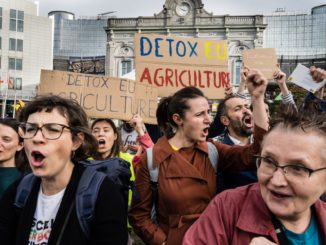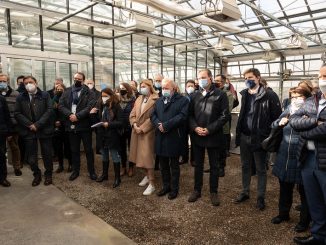UPDATE 17th December 2013:
ARC2020 platform members have seen the latest version of the Delegated Act today, Tuesday 17th December. The word pesticides has been completely removed from the Delegated Act! It has been replaced by a very weak legal reference to the WFD and nitrates directive which don’t do the job. More, including campaigning points, soon.
Following the European Parliament final vote on CAP reform on the 20th November, one would be forgiven for thinking that that’s the end of the bad news for the environment, rural Europe and best farming practices. There is however, one more stage at the European level, and its called the Delegated Act stage, stage, a new EU act category thanks to the Lisbon Treaty. And in light of this stage now appearing on the horizon, incredibly, 23 member states have bandied together to try to make EFAs – Ecological Focus Areas – even less ecologically focused. Vigilance, and pressure on your MEP, are required to prevent the worst ideas being slipped into the Delegated Acts.
 Delegated Acts are supposed to be, simply, the Commission writing up the wording of the legislation already agreed. So while the already agreed Basic Acts deal with “the objective, content, scope and duration” of an Act, Delegated Acts “supplement or amend non-essential elements of the legislative act”. They are thus subsidiary to the Basic Acts.
Delegated Acts are supposed to be, simply, the Commission writing up the wording of the legislation already agreed. So while the already agreed Basic Acts deal with “the objective, content, scope and duration” of an Act, Delegated Acts “supplement or amend non-essential elements of the legislative act”. They are thus subsidiary to the Basic Acts.
However 23 member states* have come together to try to make a case for EFA’s as places where business-as-usual can occur.
The principle behind EFA is that they help increase intensity of agro-ecological processes – like pollination, soil formation and conservation, regulation of water and nutrient cycles – for the whole agro-ecosystem of the farm and surrounding area. In order to deliver such environmental public goods, there must be appropriate conditions: if we want pollination, there should be no pesticides applied; if we want to prevent pollution from excess nutrients, no fertilisers should be applied.
Of course with the great CAP dilution of the last 2 years, exemptions have already appeared: for example protein crops grown in EFAs do allow pesticides, according to DP reg annex VI.
The group of 23 however, seem shocked that no fertilizers or pesticides (aka those euphemistic ‘plant protection products’) will be used for nitrogen fixing crops in EFAs. They cite the Draft Legislation, which states, “On areas with nitrogen fixing crops, farmers shall only grow nitrogen fixing crops that are traditionally grown with only a limited amount of plant protection products and without the use of fertilisers.”
They add: “Due to this provision, the conventional production on such areas will clearly be impossible.”
The European citizen, if informed, would surely be exasperated at the notion that pesticides may be allowed Ecological Focus Areas: such a loophole undermines the greening of CAP. While civil society will need to keep focused on this sneaky move by the group of 23, there is a one word answer to the above sentence:
Exactly.
*The states are: Belgium, Bulgaria, Czech Republic, Denmark, Estonia, Ireland, Spain, France, Croatia, Italy, Cyprus, Latvia, Luxembourg, Hungary, Malta, Austria, Poland, Portugal, Romania, Slovenia, Slovakia, Finland and Sweden.






1 Trackback / Pingback
Comments are closed.